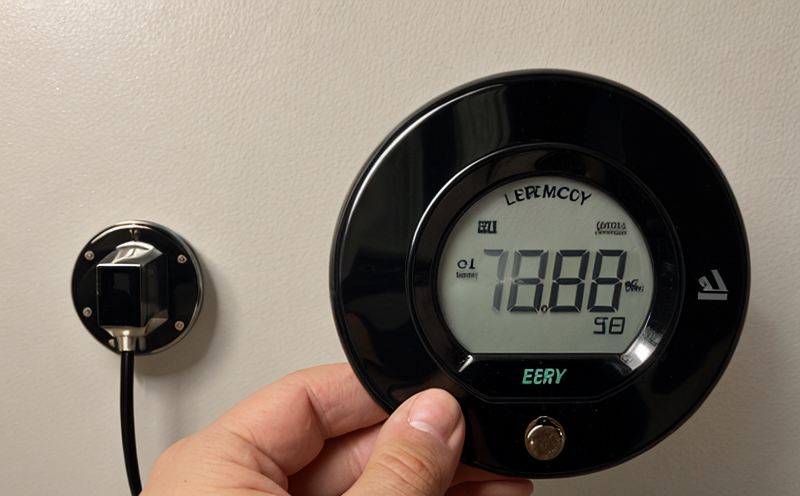JIS B 8615 Energy Consumption Testing for Heat Pumps
The Japanese Industrial Standard (JIS) B 8615 is a comprehensive guideline designed to ensure the accurate measurement and reporting of energy consumption in heat pumps. This standard plays a crucial role in promoting energy efficiency, compliance with regulatory requirements, and consumer trust by providing robust methodologies for testing. The primary goal of this service is to validate that heat pump systems meet the specified performance criteria under defined conditions.
Accurate energy consumption measurement is essential for several reasons:
- To ensure compliance with international energy efficiency regulations such as ISO 5163 and ASHRAE standards.
- To support manufacturers in achieving their sustainability goals by providing reliable data on the performance of heat pump systems.
- To assist regulatory bodies in enforcing energy efficiency policies effectively.
The testing process involves several key steps, which are outlined below:
- Specification Review: The first step is to review the product specifications and ensure they align with the JIS B 8615 requirements. This includes understanding the specific heat pump model being tested.
- Sampling and Preparation: Proper sampling of the heat pump units ensures that representative samples are used for testing. This may involve selecting a range of units based on their typical performance characteristics.
- Instrumentation Setup: The appropriate instruments must be calibrated and configured according to JIS B 8615 specifications. These include temperature sensors, flow meters, and power analyzers to measure the energy consumption accurately.
- Data Collection: Data is collected over a specified period under controlled conditions that simulate real-world usage scenarios. This data includes electrical input, heat output, and efficiency metrics.
- Analytical Assessment: The collected data undergoes rigorous analysis to determine compliance with the stated performance criteria.
- Reporting: A comprehensive report is prepared detailing all test results, including energy consumption figures, temperature changes, and efficiency ratios. This report serves as a definitive document for regulatory compliance and internal quality control.
The importance of JIS B 8615 cannot be overstated in the electronics testing sector. By adhering to these standards, manufacturers can enhance their products' marketability while ensuring that they meet stringent international requirements. This service not only aids in achieving regulatory compliance but also contributes significantly to the broader goal of promoting sustainable technology.
Applied Standards
The JIS B 8615 Energy Consumption Testing for Heat Pumps is part of a larger framework of standards that collectively aim to ensure product quality and reliability. Some key related standards include:
- JIS B 8307: General Requirements for Air Conditioners.
- ISO 5163: Performance Rating and Energy Efficiency Index of Heat Pumps.
- ASHRAE 216-2014: Test Procedure for Determining the Energy Efficiency Ratio (EER), Coefficient of Performance (COP), and Seasonal Energy Efficiency Ratio (SEER) of Single Package Central Air Conditioner/Heat Pump Systems.
These standards, along with JIS B 8615, form a comprehensive set that ensures the accuracy and reliability of energy consumption testing for heat pumps. Compliance with these standards is crucial for manufacturers to ensure their products meet both domestic and international regulatory requirements.
Industry Applications
| Application Area | Description | Relevant JIS B 8615 Metrics |
|---|---|---|
| Data Centers | Efficient cooling solutions are critical for data centers to maintain optimal operating temperatures and reduce energy costs. |
|
| Residential Heating | Heat pumps are widely used in residential heating systems to provide efficient and cost-effective heating solutions. |
|
| Commercial Buildings | Large commercial buildings require robust cooling and heating systems to meet the needs of their occupants. |
|
The JIS B 8615 Energy Consumption Testing for Heat Pumps is particularly important in these applications because it ensures that the heat pumps operate efficiently, thereby reducing energy costs and environmental impact. The testing process helps manufacturers identify areas where improvements can be made to enhance performance.
Quality and Reliability Assurance
The JIS B 8615 Energy Consumption Testing for Heat Pumps is integral to the quality assurance process. Regular testing ensures that heat pumps continue to meet specified performance criteria over time. This service provides several benefits:
- Consistent Performance: By regularly testing heat pump systems, manufacturers can ensure consistent energy consumption levels and maintain high-quality standards.
- Regulatory Compliance: Ensuring compliance with international standards such as JIS B 8615 is crucial for maintaining market access and consumer trust.
- Cost Savings: Accurate testing helps identify inefficiencies early, leading to cost savings through improved system performance.
The testing process also involves continuous monitoring of heat pump systems throughout their lifecycle. This ensures that any deviations from expected performance are identified and addressed promptly.





